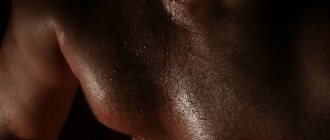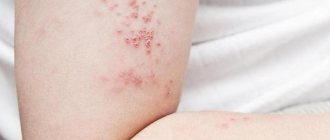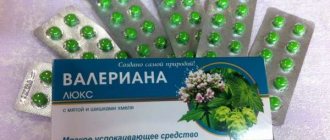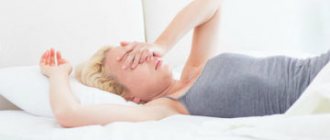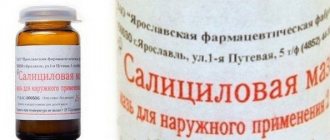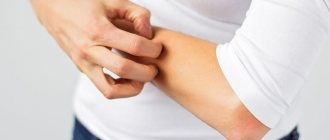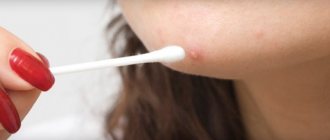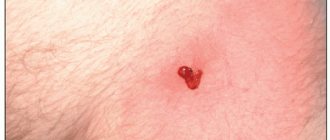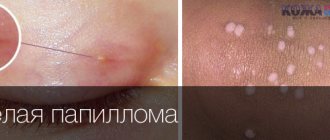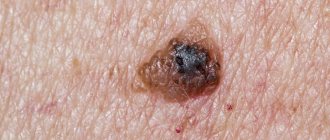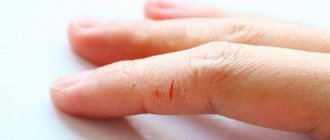Causes of heavy sweating
Heavy sweating, the reasons for which will be given below, can cause a lot of discomfort. Why does this happen and what to do if women sweat profusely during sleep and during the day? Doctors identify three main reasons when women’s feet, armpits and generally the whole body sweat a lot:
- The reasons for profuse sweating in women at night may lie in the following diseases: excess weight, heart disease, vegetative-vascular dystonia, hyperthyroidism, diabetes mellitus, hormonal imbalances (for example, in adolescence, during pregnancy, during menopause);
- in women, profuse sweating during sleep can occur as a result of frequent stress and severe nervous tension;
- External causes of sweating in women include: unbearable heat, stuffy rooms, excessive physical activity, eating foods with a lot of spices, wearing clothes made of synthetic fabrics.
Excessive sweating at times in women and men is called hyperhidrosis. It can be generalized when severe sweating occurs on the back, chest and scalp. This type of disease is most often associated with systemic internal diseases. However, local hyperhidrosis under the arms, in the area of the legs and palms can cause more trouble. It is in these places that a large number of sweat glands are concentrated, capable of secreting, especially under the arms with hyperhidrosis, up to 1500 milliliters of sweat in one hour.
Causes
Heavy sweating causes discomfort and can cause social problems. Depending on the location, it is divided into limited to several parts of the body and general. The table describes 2 types of hyperhidrosis.
| Primary (idiopathic) | Reasons cannot be found | The condition is not caused by pathologies. Its development begins at puberty. Improper functioning of the glands is a consequence of genetic predisposition. Basically, only certain parts of the body sweat a lot |
| Secondary | It is a symptom of systemic malfunctions of internal organs. | Develops as a side effect from taking certain medications. Heavy sweating occurs when: · infections; · psychoneurological disorders; · improper functioning of the thyroid gland; · pathologies of the cardiovascular and pulmonary-respiratory systems; · oncological diseases; · diabetes mellitus. |
If a person spends a long time in conditions with high temperature and humidity conditions, especially during physical activity, excessive sweating is considered normal.
If hyperhidrosis is accompanied by additional symptoms, for example, chills, fever, then you should seek medical help, as the hidden development of some disease is possible.
Viral or bacterial infection
A high temperature and profuse sweating unmistakably indicate the onset of an acute infectious disease.
- ARVI is characterized by involvement of the respiratory tract. At the same time, sweating is a normal reaction to a high temperature. The released fluid allows the body to cool down.
- Tuberculosis affects the lungs and its main symptoms are cough, chest pain and fluctuating temperature. Patients always feel weak and covered in perspiration. Pulmonary diseases are characterized by night sweats .
- Syphilis affects the nerve fibers responsible for the production of sweat, which can cause excessive sweating.
There are many infections associated with hyperhidrosis:
- sepsis;
- brucellosis;
- malaria;
- AIDS;
- systemic fungal infections;
- herpes.
Infectious and inflammatory diseases of organs:
- endocarditis;
- rheumatism;
- tonsillitis and others.
Hormones
Increased sweating for no apparent reason can be caused by hormonal changes.
- Thyroid. Increased production of thyroid hormones leads to thyrotoxicosis, characterized by hyperhidrosis .
- Menopause and pregnancy in women. The release of large amounts of hormones causes thyrotoxicosis.
- Diabetes. Pathological changes in nerve tissue cause permanent hyperhidrosis.
- Hypoglycemia. Excess adrenaline released due to lack of glucose contributes to increased sweating.
- Pheochromocytoma is a tumor of the adrenal glands that constantly produces norepinephrine with adrenaline.
- Acromegaly - increased production of growth hormone. Patients have very enlarged pores, the sweat is viscous and oily.
Other
Secondary sweating is always caused by some reason.
Endocrine factors:
- Graves' disease;
- adenoma;
- carcinoid syndrome;
- obesity;
- pancreatic dysfunction.
Neurological:
- hypothalamic syndrome;
- neuropathy (alcoholic, diabetic and others);
- neurasthenia;
- VSD;
- Syringomyelia.
Oncological:
- lymphogranulomatosis;
- NHL;
- Extra- and intramedullary tumors of the spinal canal.
Psychological:
- fear, anxiety;
- anger, stress;
- pain.
Genetic causes: familial autonomic dysfunction and cystic fibrosis.
In addition, the body reacts with increased sweat production to the following pathologies:
- hypertension;
- flat feet;
- cavernous tumor;
- follicular mucinosis;
- hypertrophic osteoarthropathy;
- poisoning with mushrooms or organophosphates.
Excessive sweating in men
Excessive sweating under the arms and throughout the body is often found in men. So, if at times men sweat during sleep and not only, what are the reasons for this:
- sweating in men can be one of the symptoms of various infectious diseases, such as malaria, tuberculosis, pneumonia, as well as nervous and endocrine (thyroid diseases, diabetes mellitus) diseases;
- in men, sweating at night occurs as a result of kidney disease, during which the processes of formation and filtration of urine are disrupted, as a result of which excess fluid is released through sweat;
- in men, sweating during sleep occurs as a result of obesity, especially in hot weather;
- excessive nervous excitability, during which increased sweating appears from time to time due to excitement, fear or other emotional states. However, normally such irritants are not directly related to the process of sweating;
- In men, hyperhidrosis at night can be caused by taking certain medications (medicines containing pilocarpine, insulin, acetylsalicylic acid).
Increased sweating at night in the area of the legs, palms and armpits usually occurs as a result of stress, with hyperhidrosis; at times, sweating can begin even with slight excitement. In men with this disease, the head often begins to sweat, and sweating of the feet at times may indicate the presence of fungal skin diseases.
When is medical help needed?
Sometimes excessive sweating in men can be eliminated independently, without resorting to medical help. If a man begins to sweat due to external factors, then after eliminating them on his own, the sweating will disappear. If excessive sweating during sleep or while awake does not depend on external causes and is associated with disorders in the body, then you should urgently consult a doctor. Doctor's help is necessary for men who have the following symptoms due to sweating:
A guy with a problem should contact a therapist, who will conduct a general examination and collect anamnesis. If the therapist cannot determine the cause, the help of highly specialized doctors is required: endocrinologist, infectious disease specialist, dermatologist, neurologist, oncologist and others. After diagnostic procedures and identification of the source of the disorder, individual treatment will be prescribed.
Why do armpits, palms and feet sweat?
As a rule, sweating at night is explained by the presence of a disease, but in some cases it can occur as a result of severe overexertion, work in a mode of increased responsibility and other factors. Local hyperhidrosis most often affects women, probably as a result of a more vulnerable nervous system.
What should I do if a strong feeling occurs during sleep or at times? In this case, it is recommended to consult a doctor, who will determine the cause of sweating during sleep and prescribe effective remedies.
Types of hyperhidrosis
There are two types of hyperhidrosis:
- Local (local).
- Generalized.
With local hyperhidrosis, only some parts of the body experience profuse sweating. For example, only the head, or hands, or feet. Most often, the armpits suffer from increased sweating.
With generalized hyperhidrosis, the whole body sweats at the same time. It usually occurs with infectious diseases, high temperature, and fever. In this way our body fights the disease. Here, a doctor's appointment cannot be avoided.
In addition to the above types, hyperhidrosis is divided into:
- primary;
- secondary.
Primary hyperhidrosis occurs in adolescence, when puberty occurs. According to statistics, it occurs in 1-2% of the teenage population.
Secondary hyperhidrosis is a consequence of neurological, endocrine and somatic diseases.
Sweating treatment
What to do if sweating bothers you not only during the day, but also during sleep? First of all, in order not to waste time, you need to visit a dermatologist. He will prescribe appropriate treatment and tell you what to do.
If severe sweating of the palms, legs and armpits at night is caused by neurological problems, then in this case the doctor will prescribe B vitamins, drugs that relieve nervous tension, hydrotherapy, rubbing with talcum powder, zinc oxide and salicylic acid. In some cases, medications are prescribed to prevent stimulation of the sweat glands and stop sweating altogether. However, they can only be used as prescribed by a doctor to avoid side effects.
Iontophoresis procedures, when an electric current is used to block the excretory ducts of the sweat glands, as well as injections of botulinum toxins, which block the nerve endings that stimulate the work of the sweat glands, will help get rid of heavy sweating during sleep. True, such procedures cannot be done for people with neuromuscular diseases and pregnant women.
The problem of excessive sweating during sleep can be solved using laser destruction of sweat gland cells. This can also be done using surgical intervention, when local excision of tissue with sweat glands in the armpit area is carried out, or part of the nerve coming from the spinal cord and responsible for the functioning of the sweat glands is pinched and destroyed. Unfortunately, during surgery, the problem of increased sweating at night can occur in other areas of the body.
What to do and how to treat excessive sweating
Of course, every person suffering from excessive sweating, with all his heart, wants to get rid of both heavy sweating under the arms and the whole body. In this case, it is appropriate to analyze your own condition, and if there are no obvious causes of hyperhidrosis, then you need to consult a doctor for help. To combat the situation in question, a huge number of therapeutic methods have been developed, which in most cases allow one to cope with the situation. It is for this reason that the most effective methods of combating increased secretion of sweat glands are described below, however, it is appropriate to use them only if they do not contradict the therapy prescribed by the attending physician.
Treatment with folk remedies
As part of the treatment of hyperhidrosis with folk remedies, two strategies can be used, each of which can be implemented separately or in combination. More specifically, it is possible to use external remedies and internal products.
- Among the external ones, it is necessary to highlight baths with oak bark, for which a decoction should be prepared and then mixed with water while bathing. To create a healing component, you need to pour 100 grams of oak bark with a liter of boiling water, then cook the mixture for 20 minutes over low heat, and then strain and cool.
- For oral administration, it is recommended to use green tea with lemon balm, which helps normalize the functioning of the sweat glands. You can also brew sage in the following proportions: 2 tablespoons per glass of boiling water. The resulting mixture must be infused under the lid for half an hour, then strained and drunk twice a day, a third of a glass.
Medications
In some cases, pharmacological agents are used to combat excessive sweating. These drugs can be represented by medications of three main groups. For example, in certain situations, sedatives may be used, but if their effect does not allow achieving the desired result, tranquilizers (Phenazepam, Sonapax) are included in the treatment strategy.
Another medicinal group consists of drugs such as belladonna alkaloids, the main active ingredient of which is atropine. Among these drugs, Belloid, Bellataminal or Bellaspon are most often prescribed. In some cases, calcium channel blockers cannot be avoided, the main representative of which is Diltiazem.
Salon treatments will help get rid of the problem
If there is a problem such as local hyperhidrosis, some cosmetic methods can be used. Conventionally, they can be divided into three groups:
- non-operative effects, for example, the injection of Botox under the skin, which has not only a preventive, but also a pronounced therapeutic effect;
- surgery to remove the cause of excessive sweating, such as a blockage of the sympathetic nerve;
- hardware methods, among which most often use electromagnetic influence on the subcutaneous layers in order to correct the activity of the sweat glands.
Preventing Excessive Sweating
To prevent excessive sweating from bothering you at night, you can use various preventive measures. So, what remedies can be used to combat excessive sweating during sleep:
- Completely overhaul your wardrobe, keeping it in silk, linen, wool and cotton that allows your skin to breathe while you sleep. If your feet sweat a lot, it is recommended to wear shoes made of natural materials;
- try to drink less liquid, remove coffee, spices, and hot seasonings from your diet. You can reduce sweating using remedies such as nettle, lemon balm or sage tea. It is recommended to drink them throughout the day;
- remove armpit hair, take a contrast shower every day, finishing the procedure with a douche of cold water. While taking a bath, add a decoction of oak bark or sage to the water. Try to walk barefoot more often;
- Apply antiperspirants and other anti-sweating products to clean, dry skin under the arms. Due to the presence of zinc elements and active plant components in their composition, they reduce the amount of sweat produced, prevent unpleasant odors and fight bacteria. The antiperspirant deodorant Dry Dry Sensitive has proven itself to be excellent and can be used during severe sweating of the feet, armpits and palms: it is enough to use it only once every three days;
- try to distribute your workload more rationally, walk more often in the fresh air, rest more often, avoid stress and do not try to complete a week’s work in a day. It is likely that a calmed body will be able to independently regulate the intensity of sweating, and the problem of hyperhidrosis will disappear on its own.
Many people face the problem of excessive sweating, which can greatly impair their quality of life. First of all, it is recommended to consult a doctor for examination. If the reason is not related to the disease, then try to adhere to a healthy lifestyle, in which case you will forever forget about such a problem as excessive sweating.
Symptoms of hyperhidrosis
Excessive sweating can be diagnosed by the following symptoms:
- the skin on areas of the body subject to heavy sweating is moist and cool;
- there is a bluish tint to the skin of the hands and feet, this is associated with a disorder of the peripheral blood supply;
- the presence of a sour smell of sweat is caused by bacterial microflora. The secretions of the sweat glands themselves have no odor;
- staining of secreted sweat is present in people working in chemical plants.
It should be noted that sometimes the smell of sweat is not due to the activity of bacteria. When excreted in sweat, elements of tobacco, alcoholic toxins, and decay products of garlic or onions may be present. This is what causes the unpleasant odor.
Degrees of sweating
Young women and those aged 50 years and older may experience one of three degrees of sweating. In the first degree (milder), the amount of sweat produced does not affect the quality of life of women. In the second, there is intense sweating with perspiration on the face and palms, but the problem can arise when a woman experiences excitement. Despite this condition being quite noticeable to people around, the problem is not yet acute.
The most severe is the last degree, which is often accompanied by the appearance of complexes in women due to intense sweating, and her usual way of life is disrupted, she feels severe discomfort.
Diagnosis of hyperhidrosis
The problem of excessive sweating is divided into three levels of intensity:
- The first is characterized by the fact that a person experiences some sweating, but it is not particularly noticeable and does not bother him. This is the easy stage.
- The second degree is distinguished by the fact that profuse sweat is produced, which sometimes even flows over the face and body, has an unpleasant odor, and makes clothes wet. The person does not look aesthetically pleasing. This stage is characterized as hypohidrosis of moderate severity, but not yet excessive.
- We can talk about the onset of the third degree when a person walks around wet all day, a heavy odor emanates from him, and unpleasant skin problems begin. He looks extremely unattractive. This type of excessive sweating is considered severe hyperhidrosis.
Sweating is an unpleasant pathology for the person himself and those around him.
The main thing is that it and the reason that causes it are difficult to cope with. As soon as a person suffering from it takes a shower, drinks soft drinks, or even just dresses lighter in the morning, he will soon again be all overly wet in the armpits or head. Deodorants and antiperspirants only partially help. Poor health and discomfort in the armpits and body remain and interfere with normal life activities. It is worth taking more effective measures and fighting the causes, not the consequences, of sweating.
Hyperhidrosis is identified as a separate pathological condition and, if it is observed for a sufficiently long time, you should consult a specialist. First of all, because excessive sweating of the body can be a symptom of many diseases. In addition, the constant presence of sweat fluid contributes to clogging of pores, difficulty in cleansing the skin, the attachment of infectious and parasitic agents, which causes skin problems, which, in turn, cause sweating and unpleasant odor.
Prevention
Prevention of excessive sweating in women is associated with the degree and form of hyperhidrosis. In all cases, a thorough examination and clarification of the exact diagnosis of concomitant diseases is necessary.
Certain methods of prevention will help with this:
- Physical activity should be used only if there is a lack of physical activity. This is especially necessary for people who lead a sedentary lifestyle.
- Maintaining proper nutrition. No special diet is needed; you should reduce the amount of sweet and spicy foods you consume. It is also not recommended to include harmful foods in your diet.
- Personal hygiene. This includes taking a shower every day, constantly using antiperspirants and eau de toilette, changing socks and underwear every day, wearing clean clothes and shoes, and including clothes made from natural fabrics in your wardrobe, especially in the summer.
Whatever the cause of excessive sweating, it is necessary to determine exactly what caused it and begin the correct treatment.
Excessive sweating in a woman is an unpleasant condition that causes her a lot of different inconveniences. You should definitely pay attention to this pathology, especially if it appears unexpectedly. Establishing the exact cause of hyperhidrosis will allow a woman to get rid of it forever. To do this, it is possible to use medications and physiotherapeutic agents, observe the rules of personal hygiene, proper nutrition and use traditional medicine recipes.
Treatment methods
Dermatocosmetologists offer the following ways to combat hyperhidrosis:
- First of all, after the diagnosis has been established, the doctor prescribes certain antiperspirants that help reduce sweating.
- Electrophoresis and iontophoresis are also prescribed as treatment.
- To relieve emotional stress, medications (mostly sedatives) are prescribed to have a calming effect.
- Full courses of botulinum toxin injections are widely used for this syndrome. This is a remedy that is designed to “freeze” the nerve fibers responsible for large amounts of sweat and fight it.
- Sometimes medications such as antibiotics are prescribed to fight infection.
In more severe cases, when nothing else helps, surgical help may be required:
- Sympathectomy. During this operation, the nerve that controls sweat secretion is removed.
- Curettage is an operation to remove subcutaneous fat and sweat glands.
Hygiene
Of course, excessive sweating of the body implies maximum attention to hygiene.
- Frequent showers, the most effective is a contrast shower, this procedure is recommended 2 times a day. When taking a shower, it is advisable to replace your usual hygiene products with simple baby soap, which does not contain fragrances or such a rich chemical composition. It is quite correct, during the period of exacerbation of the disease, to replace all hygiene products with Green clay, which remarkably cleanses the body and hair, while promoting the healing of inflammatory processes, preventing sweating and hair restoration.
- Taking baths, which should preferably be supplemented with herbal decoctions (oak bark, chamomile, birch buds). To prepare a decoction, you need to take 6 tablespoons of herbs, which can be used individually or mixed in equal proportions. Pour 3 liters of boiling water over the herbs and let it brew; when the herbs reach room temperature, strain through cheesecloth into the bathroom. This bath should last for twenty minutes.
- Do not rewear clothes, only after washing and ironing.
- Use antiperspirant; do not replace it with deodorants or eau de toilette. It is an antiperspirant that is a special product that can not veil, but prevent sweating, by introducing its composition (the presence of salts, talc and zinc). This product is applied to cleansed skin, namely the armpits, for the feet and palms; there are other, special products. It is quite possible to replace the antiperspirant with a soda solution (1 teaspoon of soda per glass of warm, boiled water) and with such a solution it is permissible to treat the areas of the armpits, feet and palms.
- Be very careful when choosing clothes and shoes; if they are made from natural materials, then this will allow the body to breathe and moisture to evaporate on its own. This means a reduction in bacteria that contribute to the appearance of an unpleasant odor. Artificial material helps create a steam effect, increasing sweating and bacterial growth.
- Wash clothes, preferably with phosphate-free powder. If the smell of sweat or the stain does not wash off, then this place can be treated with baking soda, simply moistening the problem area, pour in the soda and foam, rinse with warm water, if necessary, the procedure can be repeated.
- In the treatment of hyperhidrosis, traditional medicine methods are widely used, which is based on the internal use of decoctions, bathing and rubbing the body.
Rubdowns
- Take sage herbs and oak bark in equal proportions, all 3 tablespoons, add a liter of water and boil for 15 minutes. Use cooled, a couple of times a day, wiping only a clean and dry body.
- 6 costs., spoon chamomile flowers, pour 2 liters of boiled hot water and let it brew until it cools completely. Pour 2 tablespoons of soda into the warm broth, mix thoroughly until the soda is completely dissolved and begin wiping areas of the body with excessive sweating. This same decoction can easily replace antiperspirant.
- Horsetail herb with vodka, in a ratio of 1:10, infuse the tincture for 10 days, in a dark, cool place, shaking occasionally. You should be careful with this tincture, it can cause allergies, but if this product does not cause an allergic reaction, then it can be used for wiping, as compresses and as an antiperspirant.
- Baths for palms and feet, with a decoction of birch buds. Birch buds 2 tablespoons, pour 0.5 liters of water and bring to a boil in a steam bath, let cool, then strain into a bowl and add 2 liters of boiled water. Steam your feet and palms in the resulting broth for at least 10 minutes. This procedure is recommended once every 2 days. After 5-7 procedures, the frequency of repeated procedures can be increased.
- Hand baths: 1 hour, dilute a spoonful of vinegar with a glass of boiled, warm water, place your hands for 5 minutes, then rinse and wipe dry.
Tinctures for internal use
- There are many indications for the use of ginger root; it is rich in healing properties and vitamins that can help combat hyperhidrosis. A tablespoon of ginger root, grated on a fine grater, a tablespoon of honey, mint leaves to taste, a tablespoon of lemon juice, pour in a decoction of chamomile (one tablespoon of chamomile per glass of boiling water), and the decoction should not exceed 40 degrees Celsius (in otherwise, honey will lose its healing properties), leave for at least 20 minutes and drink the resulting drink throughout the day.
- Sage is also great for internal use. 2 tbsp., spoons of dry sage herb, pour 200 UAH, boiling water, let it brew for at least an hour. Take 1/3 cup 2 times a day. It is worth considering that the finished decoction must be stored in a cool, dry place for no more than 2 days, after which a new decoction must be prepared.
- Dry leaves of yarrow and sage, take 25 UAH each, and pour 400 ml of hot water, leave for 1 hour, strain and drink 300 ml of decoction throughout the day.
- Rosehip decoction is very good for treatment: 3 tbsp., spoons of berries, pour 1 liter of boiling water and leave for at least 3 hours in a thermos. Drink the resulting decoction throughout the day.
Taking baths
- Pine needles are well suited for taking a bath in case of excessive sweating; it is a remedy that prevents sweating and at the same time soothes. To prepare the decoction you will need 200 g. pine needles, add 2 liters of water and boil in a steam bath for 15 minutes. After this, cool and pour into the bathroom through gauze. The procedure takes from 10 to 20 minutes.
- Seed, also one of the most effective for skin diseases, for decoction, in the bath you need 4 tbsp., spoons of string and 3 tbsp., spoons of chamomile, pour 3 liters of boiling water, after cooling, add 2 tbsp., spoons of sea salt and 4 drops of oil carnations. As soon as all the components dissolve, pour the broth into the bathroom through gauze.
- Baths based on sea salt, where the amount of salt required for 1 procedure is usually indicated by the manufacturer. It is quite acceptable to supplement a salt bath with 5 to 7 drops of essential oil: juniper oil, citrus oils (such oils can improve the condition of the body and hair), sea buckthorn oil (relieves inflammation of the skin), tea tree (dries the skin and tightens pores).
In the modern world, medicine has come a long way and at the moment there are almost no unsolvable problems, such as excessive sweating in men and women. The main thing is to consult a specialist at the first symptoms and begin treatment as soon as possible, always relying on the doctor’s recommendations. Then it will be possible to quickly eliminate the causes, and the problem will be solved quickly and for a long time.
Primary or idiopathic hyperhidrosis
Primary hyperhidrosis does not occur due to any other disorder and is not associated with a side effect of medications. With it, sweat constantly appears only in certain areas of the skin: hyperhidrosis is recorded on the hands, feet, palms, and face.
Severe sweating can occur in childhood and in adults.
Excessive sweating in this case often begins and develops in childhood or adolescence, and not in old age, especially when it comes to sweating of the hands and feet. It is interesting to note that although people with this type of condition experience excessive sweating at least several times a week, they usually do not suffer from it while sleeping.
The cause of this syndrome is often heredity. However, patients do not always know if they have relatives suffering from this syndrome in their family, as many are embarrassed to talk about the problem.
